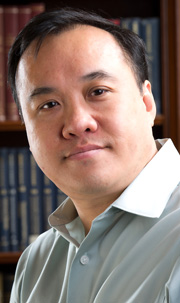A scientist born in Windsor but who now conducts his research at New York’s Columbia University will discuss how a natural product derived from plants like aloe vera may slow the progress of such neurodegenerative diseases as Parkinson’s and Alzheimer’s when he appears as a featured speaker at a conference here next week.
 Haung Yu, an assistant professor of pathology and cell biology at Columbia’s Taub Institute for Alzheimer's Disease Research, studies the effect of a sugar-like natural compound called trehalose and its effects on autophagy, the basic mechanism of degradation of redundant or dysfunctional cellular components. He’s also studying a protein called tau, which can produce neurofibrillary tangles that gum up neurons and restrict brain cell function.
Haung Yu, an assistant professor of pathology and cell biology at Columbia’s Taub Institute for Alzheimer's Disease Research, studies the effect of a sugar-like natural compound called trehalose and its effects on autophagy, the basic mechanism of degradation of redundant or dysfunctional cellular components. He’s also studying a protein called tau, which can produce neurofibrillary tangles that gum up neurons and restrict brain cell function.
“Trehalose is potentially important for removing some of the negative proteins that build up,” Dr. Yu said. “It’s similar to unclogging arteries. It’s a process that we’re still trying to figure out.”
Yu is one of the featured speakers at the tenth annual Natural Health Products Research Society of Canada’s conference being held in Windsor May 12-15. The event – organized under the guidance of UWindsor biochemistry professor Siyaram Pandey – will bring together experts from around the world to discuss the latest scientific advancements in everything from how natural health products can treat infections and enhance immunities to how they can fight cancer, diabetes, dementia and other conditions.
Yu, who moved away from Windsor at the age of eight and eventually graduated from the University of Toronto, said Alzheimer's and Parkinson's disease are two major neurodegenerative diseases that are associated with incompetent autophagic activity.
“By assessing how the proteins like tau accumulate, as well as how mutations in enzymatic function in cell and animal models occur, we can increase our understanding of the neurodegenerative process and why proteins accumulate,” he said.
Testing a product like trehalose in human clinical trials is still a long ways off, Yu added, noting that some scientists have cautioned that because it’s a sugar-like substance, it could create increased rates of diabetes in some people. Still, he’s encouraged by the results he has been obtaining to so far.
“These studies will provide insights into some of the key theories about the development of Alzheimer's pathology,” he said.
Yu will deliver his plenary address in the Augustus II room at Caesars Windsor at 1 p.m. on May 13.
